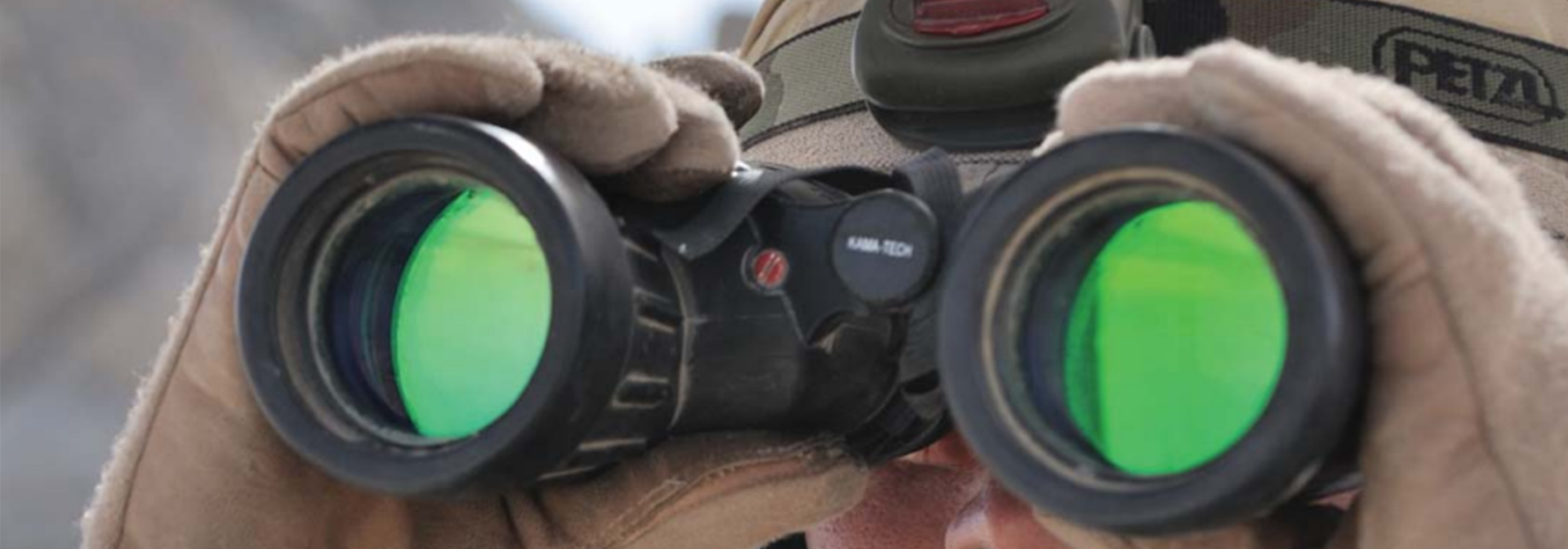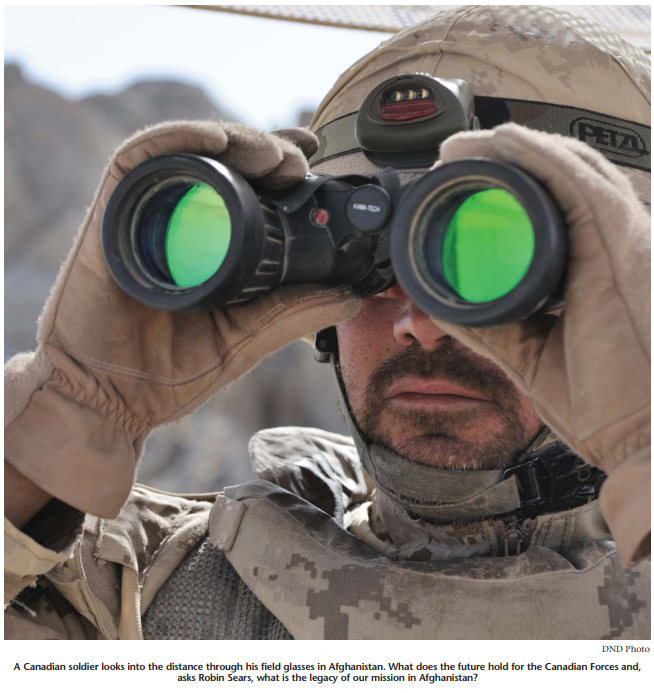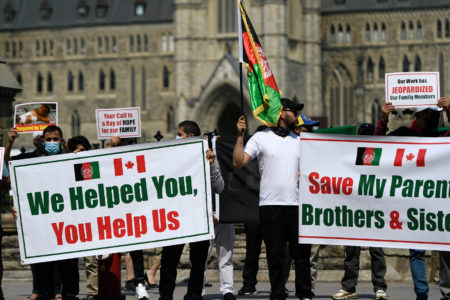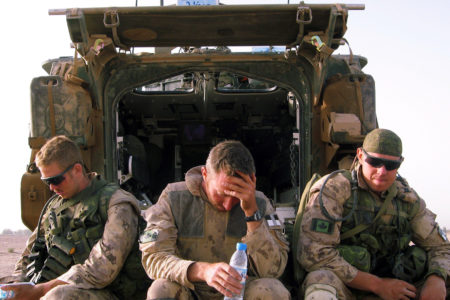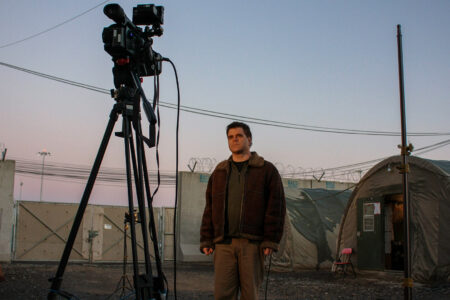
Since the discovery of the marvellous skull-smashing potential of a large rock, kings and tyrants have been thrilled by war. For several millennia war was the default choice for subduing an opponent or stealing his territory. Far more reliable a tool of statecraft than intertribal marriage or paying tribute, choosing to go to war has only recently been overtaken by an enthusiasm for negotiated peace. War typically delivered considerable domestic benefits as well: stimulating the economy, stealing the thunder of internal rivals and changing the channel on domestic embarrassments.
As recently as the 1980s, Margaret Thatcher adroitly diverted attention from her soaring deficit and unemployment problems with a little “Argie bashing.” The Falklands War proved a powerful tonic for her sagging poll numbers. The last jolly little war restored English self-confidence and secured Thatcher’s place in power for the succeeding decade.
Saddam Hussein chose to launch the nine-year war against Iran — in which, as Henry Kissinger observed, one wished “there could have been two losers” — as a means of diverting attention from his internal repression and to solidify his regional ambitions. If you were a member of one of the families who lost loved ones in that obscenely bloody and, in the end, meaningless conflict, you were among more than a million losers.
Today’s religious and ideologically driven wars should not be confused with the wars of choice dating back to the Crusades, or the dozens of others that sailed under such flags. Whether the banners of war were crosses or swastikas, nearly all of the European wars before this century were the conscious political choice of at least one of the state belligerents. More often today it is the state versus local and/or foreign militants.
Choosing war as a means of solving a border dispute or exploiting a neighbouring enemy’s weakness has lost favour in recent decades. It would be foolish to conclude that today’s national leaders are more peace-loving than their hundreds of generations of blood-stained forbears. No, the reason for the declining popularity of the chosen war is unsatisfactory outcomes.
It’s hard to mount a surprise attack today: an iPhone will reveal and report your plans in real time. It’s harder to amass, let alone maintain, an overwhelming military capacity when a child in a niqab can end his (and, increasingly, her) own life, and the lives of your entire command post staff, in an instant. You can still brutalize your own people or drive a state into prefeudal anarchy with impunity — so long as you are not sitting on natural resources of interest to the world, or within a region of great power sensitivity. Massive military attacks on even a weak neighbour — as the Soviets discovered in Georgia — get shut down in days by the demands of international public opinion, as TV viewers are able to watch every grandmother’s death in real time.
We do seem doomed to a series of ethnically and religiously driven conflicts, however, pitting suicidal non-state aggressors against weak local governments. A low-cost guerrilla campaign fed by local extortion and foreign subvention, empowered by cheap technology and communications assets, can hobble far larger, more powerful enemies for a very long time. The list of these low-level conflicts in the last decade is already long: Algeria, Burma, Chad, Chechnya, Congo, Eritrea, Ethiopia, Somalia, Sri Lanka, Sudan, Uganda.
And then there is Afghanistan. Europe will probably be able to claim the title of the most blood-soaked soil on the planet forever, fed by two millennia of almost constant war, culminating in tens of millions of deaths in the past century alone. But Afghanistan, a thinly populated neardesert, bisected by a narrow river valley, trapped between mountains on three sides, may soon be able to claim second prize. Like Lebanon, Afghanistan has the poor fortune to be the essential crossroads between constantly warring neighbours and their distant allies. Since a foolhardy effort in 1979 by the Soviets to replace one local lackey with another, triggering a civil war, the country has not been at peace for more than a few months at a time.
Many on the international left believed we should never have attempted to force the Soviets out; many Western military advisers felt we should have left troops on the ground following their defeat. We chose to leave and the result was a rapid descent into chaos.
Far more reliable a tool of statecraft than intertribal marriage or paying tribute, choosing to go to war has only recently been overtaken by an enthusiasm for negotiated peace. War typically delivered considerable domestic benefits as well: stimulating the economy, stealing the thunder of internal rivals and changing the channel on domestic embarrassments.
The “responsibility to protect” (R2P) principle, pioneered by Canadians — among them Michael Ignatieff — and adopted by the United Nations in the wake of the Rwanda debacle, imposes a new challenge on governments in the face of tyranny, civil war or invasion. Given its patrimony, its moral authority rests nowhere more heavily than on a Canadian government. While the temptation following a slogging, frustrating decade in Afghanistan may be to simply say “Never again!” and to bail out, again, our post-2011 Afghan reality is more painful.
It is one of the miracles of the last two decades that war has diminished to levels never before seen in human history. The decline of armed conflict gets little recognition in the face of instant global transmission of any terrorist horror, mass rape or guerrilla massacre. Yet state-to-state armed conflict has virtually disappeared, perhaps only temporarily but nonetheless astonishingly.
Major civil conflict rages, as do ongoing ethnic struggles, in fewer than a dozen countries. There are those battles that go by the appallingly anodyne euphemism of “asymmetric war” — a phrase that conceals some of the cruelest and most devastating uses of violence against impoverished civilian groups by state forces and their brutal militant adversaries. But with the exception of the Middle East, it seems unlikely that we will again see the thousands of massed tanks and bomber fleets thundering across a border in the style of the classic invasions of the past hundred years. This reality, combined with the astonishing impact of new technologies such as powerful robotic drones on land and in the air, is transforming military strategy as dramatically as the invention of tanks and air power did at the beginning of the last century.
Only a generation ago, in the 1980s, wars and civil conflict raged on four continents: across all of southern Africa and a half-dozen other nations in central Africa and the Maghrib; in Central America, where hundreds of thousands died; in dirty wars in Argentina, Chile, Bolivia, Peru and Colombia. Wars flared and ebbed in the Caucasus, in the Middle East, in Central Asia and in half a dozen countries in
South and Southeast Asia. Conflicts like those in Aceh and Timor that had raged for more than 30 years have been peacefully resolved. With the sad exception of the 60-year civil war in Colombia, Central and Latin America are almost entirely at peace. Burma’s ongoing effort to suppress its minority ethnic rebels is the only remaining relic of the armed conflict that had racked the region from Sri Lanka to Indochina.
Africa remains the most damaged continent, with apparently endless conflict in a belt that spans the continent from Mauritania and Mali in the east and across the Sahara to southern Sudan and the Horn of Africa. Given the resource wealth that drives many of these ethnically loaded battles, Africa will remain — with the Middle East and Central Asia — one of the most dangerous regions threatening global stability.
But today the most serious challenge to global peace remains the territory between the Iranian and Indian borders, from the Pamir plateau of Central Asia in the north to the Indian Ocean, the so-called Afpak zone.
Afghanistan today — where nearly 250,000 Afghan and foreign soldiers, supported by the world’s largest array of the most expensive and lethal tools of war, face a guerrilla army perhaps one-fifth that size — is an anomaly. We appear to be entering a world where for the first time in human history a long-term, low ebb both in wars between nations and even in wholesale civil war seems likely.
In such a world, the eruption of a new war in Tajikistan or Uganda or Eritrea may seem worth a gaze of benign neglect by the international community. They are — apologies to Neville Chamberlain — countries very far away, about which Western electorates know or care little. The deaths of nearly a million Rwandans and Congolese in those nations’ short, astonishingly cruel attempted genocide, passed virtually unnoticed by the outside world, after all, until it was almost over.
However, some places matter more to the world than others. The failure of nationhood on the Horn of Africa means that the first explosion of unconstrained piracy in modern times has inflicted rising costs on shipping for the whole world. The heart-of-darkness horrors of central Africa threaten crucial mineral supplies and the stability of southern and east Africa. The quietly vicious struggles between al-Qaeda and its cousins in the states of the Maghrib threaten a new surge of North African refugees flooding across the Mediterranean. None has yet provoked massive military invasion to suppress them, despite the irritations; given the costs, no such response seems likely.
Apart from the Afpak zone — and more remotely, Africa — the Middle East remains the only other threat to global stability. Even there, serious efforts at a negotiated peace for the first time in more than a decade are sputtering along. Yitzhak Rabin defended his determination to negotiate peace with the Palestinians, in the face of criticism from the right that he was dealing with brutal baby killers, by saying that God does not give one the right to choose one’s enemies, and it is with them one must negotiate any peace — an important lesson to remember about Afghanistan, however revolting some of the partners to that process may be.
Sadly, in the Middle East, the current Israeli leadership is too weak and divided to negotiate seriously but, surprisingly, in Afghanistan it appears that the first real prospects of a peace process have been launched.
The international community should always choose, first, to negotiate with the enemies of peace. But it is equally important to recognize those occasions when, as Willy Brandt liked to remind naive social democratic peaceniks, the force of evil can be met only with greater force. We must never again wait, as he acknowledged his generation would forever live with the burden of having done, until too many innocents have died and too many more will be sacrificed, before moving to excise an entrenched malign power.
Leaving aside the new moral test of a responsibility to protect an innocent population brutalized by its own government or an invading army, the nightmarish choice facing statesmen of the 1930s remains for presidents and policy-makers today: confront or compromise, attack or appease.
Fate will not grant the international community the ability to choose which future conflict in Central Asia can safely be ignored. In Afghanistan, we waited too long to prevent it from poisoning relations among a half-dozen neighbours and from offering an essential redoubt to those crazed zealots whose ambitions would inflict pain on the entire world.
Yet, as Ben Rowswell — one of the young heroes of Canada’s decade in Afghanistan — cautions, “We need to be aware that these battles are not ever again likely to be 12-24-month engagements. We are making a commitment of many years, perhaps decades, when we decide we cannot avoid using force.” Rowswell is a veteran of the essential civil and diplomatic work that parallels asymmetric warfare in Iraq and Afghanistan.
Just returned from leading Canada’s development and diplomatic mission in Kandahar, Rowswell does not flinch at its costs in Canadian and
Afghan lives, given the importance he attributes to its achievements. Nor does he believe we will avoid future Afghanistans. His frank acknowledgement of the human costs and inevitable duration of such missions is sobering; his conviction that it was not only a cost worth paying, but also one that we must again be willing to take on, is compelling.
How we came to choose this apparently endless war already seems part of an increasingly misty history. American will and Saudi money drove the Soviets from Afghanistan, then left it to spiral into suicidal factional bloodshed. A twisted Pakistani national security agenda — and Saudi money again — conceived, trained and set loose on Afghanistan one of the most joyfully sadistic political perversities of the 20th century.
Revolted at the blood and screams of another hurricane of political violence, we quickly suppress our memories of the horror of the severed limbs of young children, the girls with acid-scarred eyes and the smashed skulls of young lovers murdered slowly by stoning. But it was this real-life horror movie that Pakistan’s Taliban, fostered by the Inter-Services Intelligence, and al-Qaeda, suckled on Saudi millions, inflicted in 1996 on an Afghan people already devastated by years of war.
We did not need to agonize over a responsibility to protect in deciding on this war. We might detest the abuse of our 9/11 outrage by the Bush administration in invading Iraq after Afghanistan. But it was not, and is not, credible to suggest that a counterattack on Afghanistan was avoidable.
Using our horror at the sight of thousands of innocents dying in the collapsing Twin Towers to create a war fever against Saddam Hussein was the height of political cynicism.
Afghanistan was, and remains, different. All but the most fundamentalist pacifist accept that governments have an absolute responsibility to protect their citizens, to shield them from attack and to resist attacks on them. Bin Laden attacked American citizens on American soil. The overthrow of the Taliban and the attempt to exterminate al-Qaeda were therefore not choices: they were the necessary response of any government and its allies.
However, having quickly defeated one of the most vicious political movements in modern history and driven its Arab allies into mountain hideouts, by 2003 we did have a choice.
We could have left, again. Instead, we chose not to repeat the decision to leave the Afghan people to suffer the spiral of violence, this time at the mercy of Taliban warlords and their militant Islamic allies. We made this choice both for reasons of self-interest and for reasons of compassion. Our own citizens had felt the consequences of the previous choice to leave.
Today it has become internationally fashionable to challenge the wisdom of that decision. American conservatives, Canadian Liberals, European social democrats — and even our own prime minister — are increasingly united in their contempt for the Afghan mission and increasingly determined it be terminated. Some make an efficacy or outcome argument; others question the morality of a campaign that takes the lives of so many innocents.
Those who say “It’s hopeless, let’s go home” duck the rebuke of recent history: leave again only to be forced to return one more time to an even more hopeless battlefield dominated by a new Taliban government? Those who place their thumb on the moral scales, using the tragedy of civilian deaths, ignore this decade’s impressive transformation of Afghan society, especially for rural women: transformation that remains inadequate, yes; that remains unstable, yes; but that has been life-changing for hundreds of thousands, nonetheless. Access to public health and literacy programs, to electricity and water, to functional schools and drivable roads, all at levels never before seen, is spreading across the country — even as that access is fought bitterly by the “Army of the Afghan Emirate.”
Then there are those who say, “We should never have thrown our cards in with such a corrupt family as the Karzais. How can we sacrifice our young men and women to enrich this appallingly greedy clan?” Sadly, a corollary to Rabin’s wisdom about enemies is a bitter truth about allies. The menu is limited and the choices often range from merely awful to unacceptable.
British colonial overlords did not choose contemptible young officers like Idi Amin to rule Uganda, rejecting available local Gandhis. Detestable American colonial satraps like Ferdinand Marcos were not promoted over the heads of waiting Filipino Mandelas. Terrible choices have been imposed by great powers — how were American liberals ever fooled by a murderer like Pakistani General Zia ul-Haq, the genius who gave birth to jihadi training centres disguised as madrassas?
In 2001, Hamid Karzai was an articulate, English-speaking, even eloquent defender of democracy. He was Western-educated and Washington-savvy, with brothers who ran restaurants in Baltimore. Given the bloodstained warlords available as alternatives, it is hard to see how the international community could have made a different choice.
Conflict-ridden, predemocratic societies are winner-take-all societies.
The penalty for political defeat is still often death. The prize of victory is a national treasury to be looted to strengthen your clan’s hold on that triumph. Hamid Karzai may be a sad example of a weak leader who should have known better, should have struggled harder and should have placed more limits on his family’s avarice. If only shoulds were coulds, as the saying goes; it’s not clear that he would have survived such an unnatural posture for a triumphant Afghan warlord.
Our task is to prod and poke, to quietly undermine the most corrupt and to buttress the less, to use the power of public shame and private rebuke to help move such a leadership elite away from its baser instincts. To bemoan the absence of a clean, ethical and powerful national saviour is merely childish self-indulgence, and not serious. They don’t come in that flavour in most war-torn societies.
Might it not be more appropriate to open a new chapter to the future, building on the sacrifice we have made? For all the Canadian men and women who have given their lives to an Afghan future different than these horrific decades, would that not be a more respectful and hopeful salute to their legacy?
So after 10 years of bloodshed — Canada’s longest military engagement in its history, and the longest commitment of foreign forces to the Afghan people by any of our allies — what now? Our Kandahar combat commitment will end in a year. We could simply declare victory and go home. That, in subtext, has been the response of most Canadian politicians. The Canadian political debate on our future role has been juvenile and insulting in the main. Each political party has appeared vacillating or venal or both in its response. The Prime Minister is known be contemptuous of Hamid Karzai, and to be counting the days to the end of Canada’s military role. Making his querulousness known conflicts with his government’s overall strong promilitary posture. Accordingly, his ministers have been muzzled about any post-2011 agenda.
Michael Ignatieff has discouraged his colleagues from speculating about a new role, driven by the unpopularity of the war among many Liberal activists in Ontario, Quebec and BC. The frustration of some in the caucus more expert than he on the current realities on the ground, keen to articulate a responsible hand-off to a noncombat role, may erupt as the deadline approaches.
Jack Layton has been consistent in his view that a negotiated solution is the only honourable exit strategy. But he has equally been hesitant about committing to anything beyond 2011, dodging the question of a peacekeeping or training Canadian soldiers, even if those negotiations are by then under way.
It is right to be revolted by those who would hurl insults about “cutting and running,” absent any more meaningful defence. It is reasonable and not unpatriotic to suggest that we have paid more than our share and now have other priorities. It is also wise to be skeptical about those who shout about “defending the legacy of the courageous fallen” as the only reason to send more men and women to their death.
But surely there is a more rational, measured alternative than “no change” or “all change”? We blush at foreign friends who laud Canadian compromise and tolerance. But our ability to foster and sometimes to teach the power of pluralism is one of our gifts to the world. We do know how to build supple but strong institutions and cultures of democratic governance. As the products of a stew of hundreds of threads of ethnic and cultural DNA, Canadians do know how to listen to others and equally how to adapt our learning to the history and dreams of others.
Why would we not then transform our commitment to Afghanistan to one of training and institution building? NATO is pleading with us to stay to work with the National Police training project. Civilian leaders are horrified at our looming departure from their fragile sector, one that cries out for judicial training, parliamentary education, public service development and on and on.
The training function will require Canadian soldiers to remain on the ground in a defensive security role for several more years, supporting the work of civilians and NATO allies in training and civil society development work. Given our long and painful military commitment, it is understandable that by next year we would want to say “Enough!” But why would we merely close the door on that chapter and leave, when the gains we fought for remain so precarious, so fragile?
Might it not be more appropriate to open a new chapter to the future, building on the sacrifice we have made? For all the Canadian men and women who have given their lives to an Afghan future different than these horrific decades, would that not be a more respectful and hopeful salute to their legacy?
We suffered a serious slap, delivered by the hands of many former allies, in the humiliating defeat over a seat on the Security Council. Some were moved to vote against us by the question posed by a South Asian delegate about our international profile: “Canada has disappeared! Where have you been?”
What message do we send about Canada if we simply disappear from the stage on the most important political and military dilemma in the world, securing stability in Central and South Asia? We chose, first among NATO countries, to make a military commitment to Afghanistan. We should now choose to defend the achievements we have won.
Photo: DND Photo



